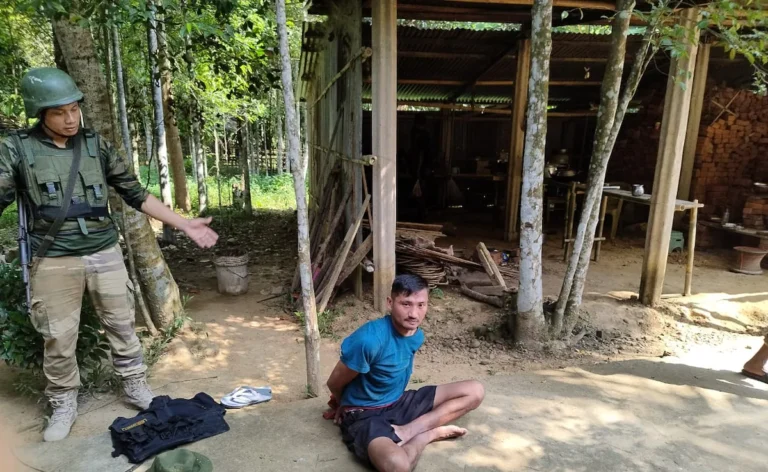Manipur Farmer Detained for Defying Order on Harvest Stalk Storage: An Overview
Summary
A Manipur farmer was detained after failing to comply with an order from the Thoubal deputy commissioner (DC), which prohibited stacking harvested rice stalks along roadsides for safety and traffic reasons. The DC stressed that roadside piles obstruct traffic and urged proper storage methods to avoid hazards and environmental issues. Additionally, the Thoubal Forest Division and environmental groups highlighted the need for sustainable farming practices, cautioning against burning leftover stalks due to its negative impact on soil health.
Detailed Article
Understanding the Ban on Roadside Rice Stalk Storage
In Thoubal, Manipur, a recent directive issued by the district’s deputy commissioner (DC), Ahanthem Subash, aimed to tackle a growing problem with post-harvest rice stalk storage. The issue arose as farmers in the area were using roadside spaces to stack large piles of rice stalks after threshing. While this may appear to be a practical, short-term solution, authorities flagged it as a major public safety concern.
The directive explicitly prohibits the practice, citing the risk it poses to commuters on these rural roads. The piled stalks can obstruct visibility, narrow road access, and create potential traffic hazards. The DC’s order asks farmers to adopt designated storage practices that maintain clear roads, thereby promoting road safety while ensuring efficient farm management.
The Incident: Farmer Detained for Non-Compliance
On a recent Thursday, the Thoubal Police Station detained a local farmer after he continued to pile his harvested rice stalks along the roadside, despite the directive. The farmer had been working near the Aarong River, where his harvested rice was stacked in open roadside spaces, directly contravening the DC’s order. Police intervened, halting the farmer’s activities and directing him to clear the area. This incident is part of a broader effort by authorities to enforce compliance with road safety and farming protocols across the district.
Environmental Concerns: The Impact of Burning Crop Residues
Beyond the safety aspect, environmental concerns have also played a significant role in the DC’s directive. Burning crop residues, a common practice in some rural areas, releases carbon dioxide and other harmful gases, impacting both air quality and soil fertility. The Thoubal Forest Division, in partnership with the People for Nature organization, recently launched a public awareness campaign to educate local farmers on the detrimental effects of burning rice stalks.
Soil health experts emphasize that burning depletes organic matter and nutrients critical for soil fertility. This practice gradually diminishes the soil’s capacity to support robust crop yields, posing long-term risks to agriculture sustainability. For this reason, the DC’s directive encourages farmers to explore alternative methods for residue management that do not rely on burning.
The Importance of Sustainable Farming in Manipur
Sustainable farming practices are gaining traction globally as agriculture faces new challenges related to climate change, soil degradation, and environmental conservation. In Manipur, the district’s leaders are proactive about integrating these methods within traditional farming. This directive on rice stalk storage and residue management aims to balance productivity with environmental stewardship.
Efforts to promote sustainability extend beyond directives, with the Thoubal Forest Division focusing on educating farmers on soil-friendly practices. Workshops, community meetings, and collaborations with environmental NGOs are some of the initiatives aimed at fostering an appreciation for sustainable farming.
Public Reaction and Challenges to Implementation
While the directive has been generally well-received as a step toward road safety and environmental health, the incident involving the detained farmer highlights some resistance among locals. For many farmers, harvesting season is a busy time, and they are often focused on maximizing productivity rather than logistical storage issues. Adjusting to these new regulations may require both time and additional support.
To ensure smoother implementation, local authorities might need to work closely with farmers, understanding their constraints and offering practical solutions. Designated storage areas, accessible guidance, and awareness programs are crucial to garnering widespread adherence to these policies.
FAQs
- Why was the farmer detained in Manipur?
The farmer was detained for stacking rice stalks along a roadside, defying a district order that prohibits this practice to ensure public safety. - What are the safety concerns related to roadside rice stalk storage?
Piling stalks by the road can obstruct traffic, block visibility, and pose potential safety hazards to commuters. - Why is burning rice stalk residues discouraged by authorities?
Burning crop residues harms soil fertility and releases pollutants that impact air quality and the environment. - What alternatives to burning are recommended for farmers?
Farmers are encouraged to use soil-friendly methods for crop residue management, such as mulching or composting, which support soil health. - How is the Thoubal district supporting sustainable farming practices?
Through partnerships with local NGOs and community campaigns, the district promotes sustainable practices and offers guidance on environmentally friendly farming.



